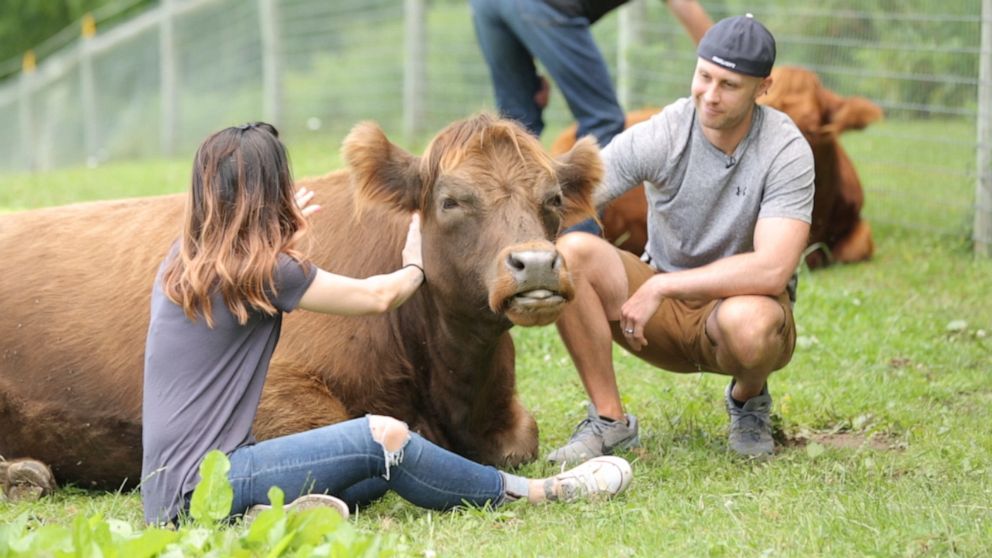Cow cuddling, flying with miniature horses are part of rapidly expanding use of support animals
Abrea Hensley and her miniature service horse, Flirty, are quite the sight. Whether at the grocery store or in the park, Flirty attracts a lot of attention.
"Going out with Flirty is definitely one of the most interesting parts of my life at this point," said Hensley. "I get a lot of questions."
This year, the duo even took a flight together after the Federal Aviation Administration cleared miniature service horses to fly.
"It was the first time Flirty had ever flown," Hensley told ABC News. "Everybody at the airport was really nice and really welcoming and helpful. The experience itself was really and truly one of the most freeing experiences I’ve had recently."
But don’t expect to run into Flirty on a plane anytime soon; Hensley doesn’t plan on making a habit with her flying horse. "It’s not something I plan on doing a lot, just because it is a lot to ask of Flirty," she said.
Watch the full story on "Nightline" tonight at 12:35 a.m. ET on ABC.
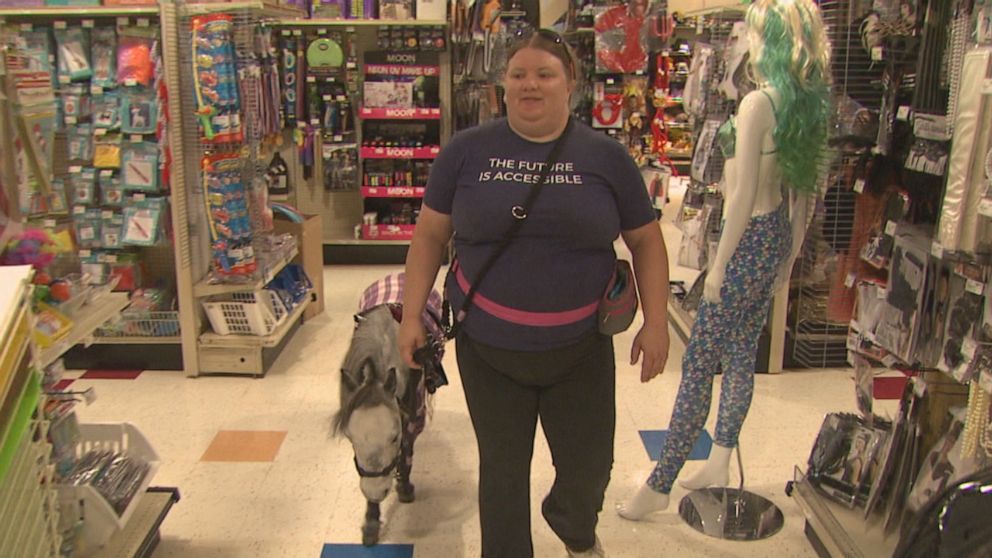
Hensley said she battled post-traumatic stress disorder and severe anxiety for years before her care team suggested a service animal might help her symptoms.
"I [am] allergic to dogs so I couldn’t get a service dog," she said, "Miniature horses are the only alternative to dogs that are allowed under the ADA [Americans with Disabilities Act]."
That was two and a half years ago, and now Flirty goes everywhere with Hensley. "We just immediately had a connection that you don't find very often with an animal. You know it's kind of a once-in-a-lifetime type bond that we have," Hensley said.
Flirty assists Hensley in a multitude of ways: "Before I actually have an anxiety attack she can predict based on my rising heart rate and cortisol levels that an anxiety attack is going to happen. She also helps me to get through them faster. She will sit there and nudge me and lick me until I start to calm down."
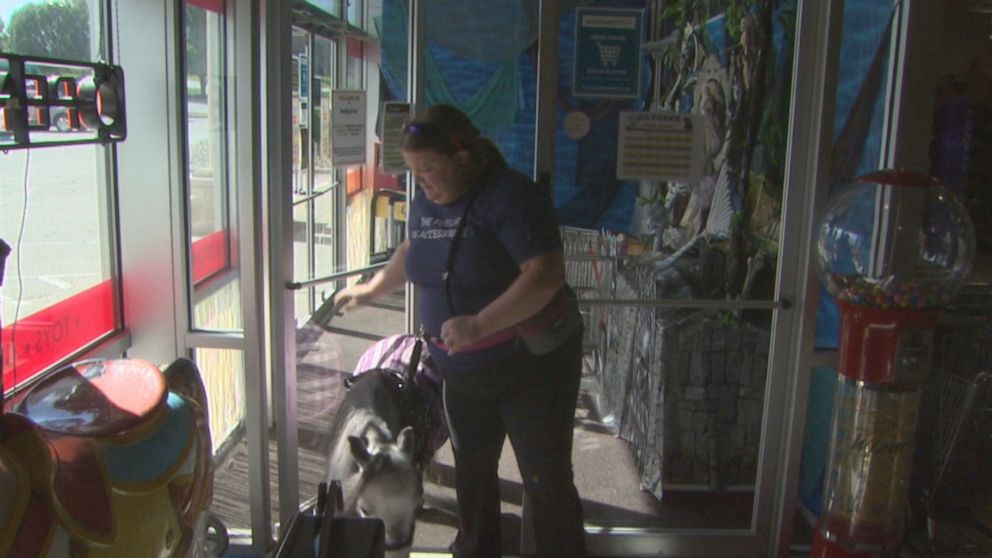
Hensley also has some mobility issues so Flirty "assists me with some walking ... as well," she said.
The use of service animals has expanded over the years. Once reserved for the vision and hearing impaired, service animals are now commonly seen on college campuses to provide stress relief during exams, in courtrooms to assist children during difficult testimonies and by the sides of veterans who experience PTSD.
A service horse is a natural choice for some.
"There are a number of reasons that somebody might choose a service horse besides just dog allergies," Hensley said. "Horses are much better suited for mobility assistance … [and] there is also the issue of the lifespan. A miniature horse will live to be approximately 35 years old, so that's about the lifespan of two to three service dogs. So that's a huge advantage there."
ABC News chief medical correspondent Dr. Jen Ashton, said there is a difference between service animals and emotional support animals.
"Generally, when we hear the word service animal or service dog, those are specifically trained animals to carry out a very specific task for a specific problem," she said. "When you talk about just an emotional support animal, that's usually an animal for whom a relationship exists with that person and the presence of that animal is soothing and comforting for that person."
Ashton addied, "Anyone who owns a pet knows how soothing and calming a pet [can] be."
The use of "comfort" animals on flights has skyrocketed lately. United Airlines saw a 77% increase from 2016 to 2017, and Delta has seen its numbers double in the recent past. Most of these emotional support animals are dogs, but other ponies may soon join Flirty in the ranks of flying horses after the recent FAA rule change.
Some say, however, that the allowances have gone too far. Last year a woman was banned from a flight after she tried to bring her emotional support peacock on the plane, and many airlines have weight and breed restrictions.
"Unfortunately, I think the influx of all kinds of animals on planes and public transportation in general has possibly swung the pendulum a little bit too far," said Ashton. "Just because a physician or health professional can certify a person as potentially benefiting from an animal is very different than going through the often very rigorous steps, selection and training process that many people who have service animals or support animals have to go through."
In upstate New York, a different kind of emotional support animal is providing moving experiences for many visitors to Mountain Horse Farm, home to Bella and Bonnie the comfort cows.
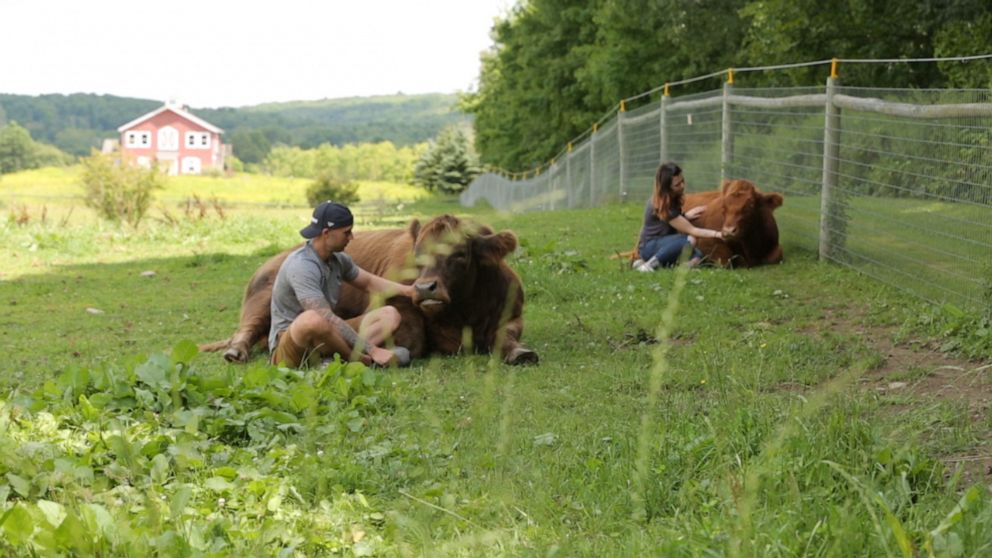
Suzanne Vullers and her husband, Rudi, own and operate Mountain Horse Farm, in Naples, New York, which doubles as a bed and breakfast and spa. But many guests come here for one specific service that’s generated a lot of buzz: cow cuddling.
"It naturally relaxes you," said Suzanne Vullers. "A lot of people are looking for mindfulness. They’re looking for ways to calm down their head and their body. When you are with a large animal like that, they command your presence. ... There's no way you can be somewhere else when you're with them because they're so big. And that creates a natural mindfulness."
It's a practice Vullers said hails from her native Netherlands called "koe knuffelen," which translates to "cow hugging," and it’s meant to get people back in touch with nature.
"Touching a living being kind of relaxes you and it's very similar to you getting a massage," she said. "The benefits are very similar as well."
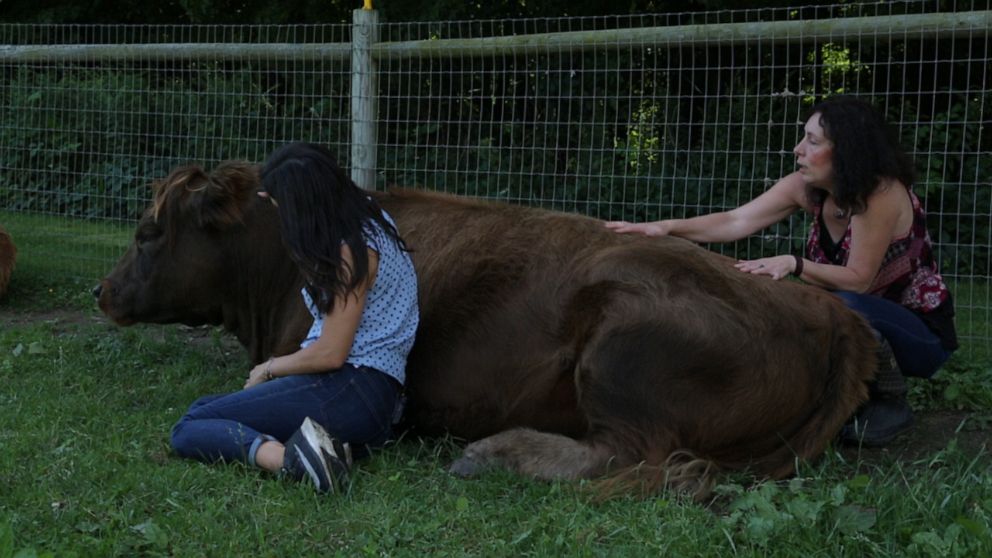
When visitors come to the farm they are led out to the pasture to meet the animals while they relax in the shade. Then the cuddling commences. Suzanne said seeing people lie down next to her animals is "her favorite moment" of the experience.
"It makes you go so quiet, and it’s so relaxing, and it’s such a joy that they want to connect with you in that way," she said.
Sheryl and Brandon Hertel, from Buffalo, New York, visited Mountain Horse farm late last summer. They came to celebrate Sheryl’s birthday.
"I thought she was kidding at first," Brandon Hertel said of his wife. "She wants to pet the cows."
"I just hope they like me," said Sheryl Hertel. "As weird as that sounds!"
The duo set out with Vullers, entering the pasture as Bonnie and Bella relaxed. Vullers instructed the couple on how to sit with the cow so that her head would lay in their laps.
The session was a success.
"It was amazing," said Sheryl Hertel. "Everything I thought it would be ... you felt like they could actually understand you. ... My heart was ready to explode. I loved it."
"It was surprisingly relaxing," added her husband. "You’d think interacting with a big animal wouldn’t be relaxing, but it is shockingly relaxing."
For some, it’s about more than a stress-free afternoon. Hensley said her connection to Flirty saved her life.
"My treatment team was very concerned that I wouldn't live more than a year or two without having a service animal," she said. "So because of Flirty I am still here. I am still able to go out and function in society. And she's just been a huge lifesaver and complete life changer for me. I'm very grateful to have her."
